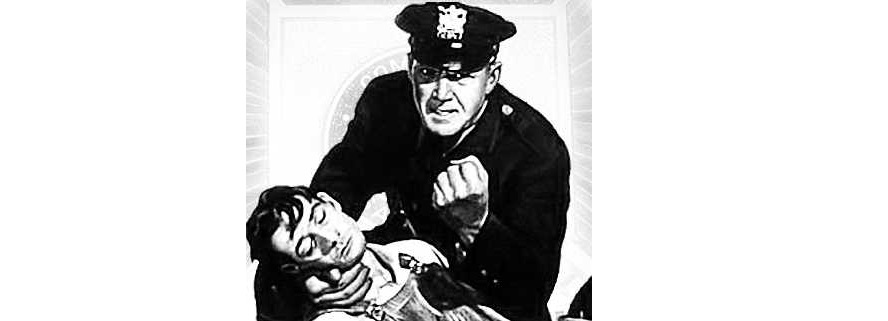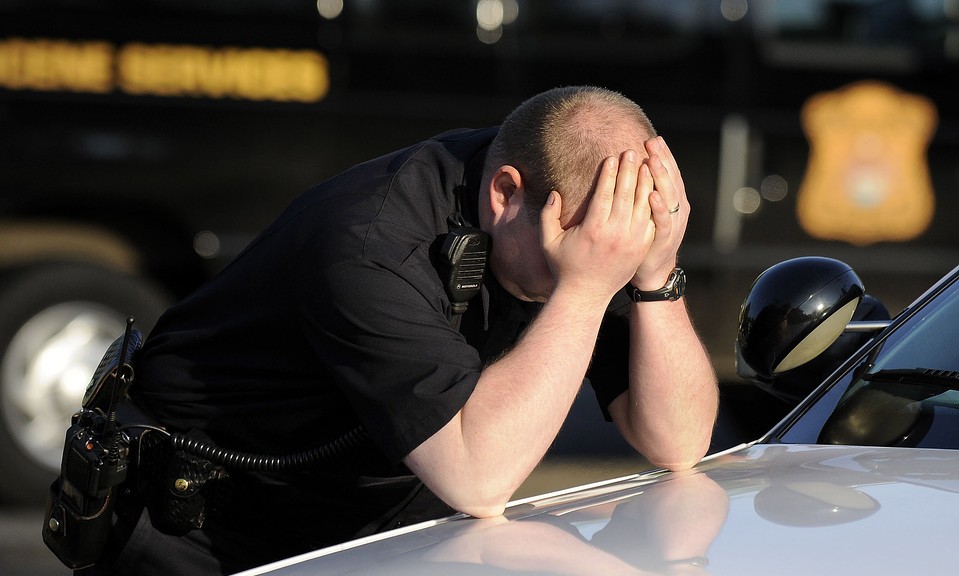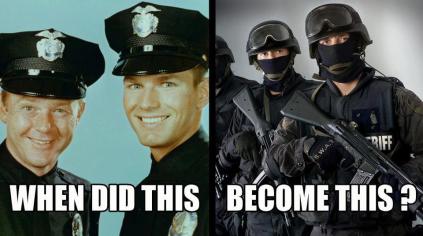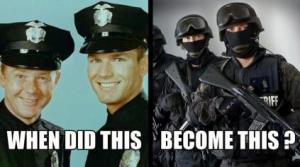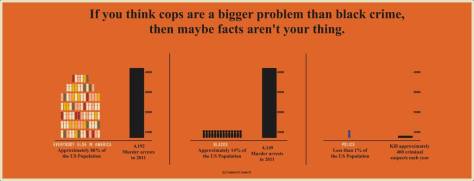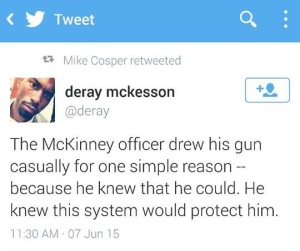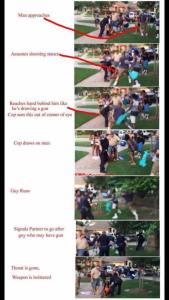Much has been made of the grand jury’s decision to no-bill the officers involved in the death of Eric Garner. As someone who’s spent nearly 8 years as a cop in one of America’s biggest cities, I figured it’s time to weigh in. This will be a pretty lengthy post, because there are a lot of angles to cover. But anything worth learning usually takes some time to learn, so bear with me. Most cops don’t like to bring attention to the dangers we face every single day. It’s just not considered very manly to talk about it when we are supposed to be brave, courageous, heroic, whatever. Most cops also just don’t like attention in general, even good attention. It just makes us uncomfortable. We certainly appreciate when people thank us for what we do, but it’s still a little awkward. But given how much ignorance and how many lies are spreading through the minds of society at large, I feel it’s necessary to talk about it, because only one side of the story is being told it seems.
Unlike most people, I do have inside knowledge of police tactics. I often see comments from people who say the cops should have handled it this way or that way, all from the safety of their couches. The problem is, despite their best intentions, they have absolutely no idea what they’re talking about. Do you tell the doctor how to do his job? No, because you admittedly have no clue as to what his job entails or how to make the correct decision if you haven’t been trained in his field of expertise. Feel that’s too much of a stretch? Fine, how about the military? Anyone telling soldiers how to do their jobs while they’re in Iraq? No. This is something you will readily admit with most people’s professions, but when it comes to how police work should be done, people throw all of that out the window. Everyone’s an expert now. Everyone’s apparently been through a police academy. Everyone’s apparently actually faced danger on the streets. Everyone has a law degree. Everything could have been done better if only THEY had been the ones making the decisions, right? This doesn’t mean police should be immune to criticism or even criminal charges themselves, but it does mean that the lay person watching a cell phone video probably isn’t qualified to render a fair assessment of what happened. That’s what the grand jury does. They’re presented with all of the available evidence (which you are not) and an explanation of the laws (which you are not), which charges the grand jury are considering (which you are not), witness and defendant testimony (which you are not) and then they come to a decision.
Eric Garner was told he was under arrest for selling cigarettes. Whether this is a stupid law or not is something I’ll get to later, but it is and was a law in New York City. A law that Garner was breaking. A law that Garner had already been arrested for breaking multiple times. Garner had been arrested 31 times in his short life and was confirmed to be part of an organized crime ring for smuggling cigarettes. Now before you jump to conclusions and assume that I’m saying he deserved to die for these things, hear me out. Eric Garner did NOT deserve to die for any of these things. In case that wasn’t clear, let me repeat myself. Eric Garner DID NOT deserve to die for selling illegal cigarettes. He also DID NOT deserve to die for lying to police about his name, driving without a license, possession of marijuana, resisting arrest, or any of the other crimes he committed. He didn’t deserve to die. He didn’t. Am I clear? He didn’t deserve to die. I feel the need to repeat this ad nauseum because it seems most people won’t hear or believe that I am trying to convey any other message unless I explicitly and repeatedly say that he DID NOT deserve death for these infractions.
But his lengthy criminal history does say something about him. What it says is that he had no respect for the law, and apparently the laws and punishments in place did nothing to dissuade him from continuing to break the law, otherwise he would have stopped. Garner clearly put the financial benefit of illegally selling cigarettes on one side of the scale and on the other side he put the repercussions for getting caught and decided the money had more weight. It was worth the risk to him. This is a simple, undeniable truth. Now hold that thought and let’s talk about the arrest itself.
Garner was 6’3″ and over 350 pounds. It SHOULD go without saying that if a man of that size decides to fight you, it’s going to be a tough fight. I say it “should” go without saying because many people think that once a person goes through a police academy and puts on a vest and a gun that they’re an elite fighting warrior who can single handedly kick anyone’s butt with the greatest of ease. Sure, we get extensive training and yes, we have weapons, but that doesn’t make us invincible. And yes, there are inherent risks that come with the job. But we’re not Batman. We bleed just like you. We feel pain just like you. We get injured like you and we die like you. And no one wants to take a punch or be tackled by someone weighing in at 6’3″ 350, whether it’s a cop or someone who takes punches for a living like boxers or MMA fighters. A man of that size could in fact kill someone with a single, well placed punch to the head. It’s been done before by guys much smaller than Garner. The officers there know that. The officers there very likely have been assaulted before while trying to make arrests. I was told in the police academy that if you go through an entire police career without being assaulted and injured then you’ve done an extremely rare thing (and likely sat at a desk for most of your career). And here’s a shocker, you usually don’t see it coming. People don’t normally make a habit of warning someone before they throw a punch. They just throw it. And by then, the damage is done.
So let’s put ourselves into the officers’ shoes, as much as we possibly can. They’re up against a very large man. Much bigger than any single officer there. They know without a doubt that if this guy decides to fight, someone’s going to get hurt, even if the arrest is eventually made. Yes, they have the advantage of numbers, but like I said before, it only takes one swing from a guy this big to do some serious damage. Want to be the first one to fall on that grenade? The officers there know this is a possibility. He was also very agitated and had raised his voice and was swinging his hands around in swift, angry movements. What that would tell me as an officer is that I’ve got a guy that’s not likely to simply turn around and put his hands behind his back. Those officers very likely had the same fear. They knew that tensions were high and that they had a powder keg that could explode at any minute. But they told him he was under arrest and gave him the opportunity to comply. He refused. And the moment — the very moment — that Garner pulls his hands away those officers know that things will probably only get worse before they get better. They’ve already asked him, without laying a finger on him, to put his hands behind his back. The order was refused. So the next step was to actually grab his wrist and put the handcuffs on, even though he wasn’t complying with the verbal command. Again, he refused by pulling his hands away. Now this is where the first bit of controversy comes in. What should the officers have done differently at this point? Continued to ask him nicely with a cherry on top? Stand around and talk about it for hours on end and hope that eventually out of boredom or exhaustion he finally complies and goes peacefully? Walk away and let him continue to break the law? Sorry folks, that’s not the way policing works. That’s not the way the law works.
The officers then swiftly and aggressively took Garner to the ground. Was it too aggressive? I’ve had people pull their arms away from me in an effort to continue arguing or pleading that they shouldn’t be arrested. I didn’t immediately take them to the ground, but then again none of these people were 6’3″ 350 pounds either. At the point that Garner pulls his hands away (and thereby resists arrest by New York state penal code definition) there’s an increased risk of injury to the officers the longer they allow this to continue. And have you ever heard the term “give them an inch and they’ll take a mile?” Suppose they didn’t immediately take him to the ground. Suppose Garner continues to pull his arms away any time the officers moved in to put handcuffs on. Suppose this happens multiple times, and the officers continue to beg and plead and ask nicely for compliance. Every time this happens, the officers are going to look weaker and weaker and more impotent. And in Garner’s mind, confidence that he can continue to resist arrest without repercussions is going to grow and grow by each passing second. The more confidence he has that these officers are a bunch of push overs the more likely he may be to push the envelope even further. This is all hypothetical of course because the officers didn’t take this route, but you can see where the danger lies for the officers in this scenario.
Now some people may (and probably will) make a case that the officers should have done this anyway. That they should have continued to ask nicely until Garner finally decided to throw a punch or attempt to run and THEN move in swiftly and aggressively. The main problem with this logical fallacy is that you’re sending a message that it’s OK to resist arrest and that the officers will be powerless to do anything about it until they’ve actually been assaulted, which can often lead to injury and occasionally death. If you’re going to set a pretense that officers have to allow themselves to be assaulted and thereby likely injured or possibly killed before they’re allowed to take action, you’re not going to find anyone willing to do the job, especially at what we get paid. No, the officers have the right to protect themselves from injury and death, even proactively. I’m not talking about The Minority Report here, I’m talking about being proactive in making an arrest before you lose the element of surprise and thereby the advantage in getting a guy into handcuffs without being hurt or killed. The kind of take down we saw in the Eric Garner video is not all that uncommon with suspects who begin to resist arrest, especially when they’re as big as Garner was. And most of the time no one gets hurt, including the arrestee. Even more rare is that the arrestee dies. If you compared the number of arrests with the number of deaths during arrest the contrast would be astounding.
The difference in the Eric Garner case is that he had asthma and hyper-tensive cardiovascular disease. These medical conditions are not something that the officers likely knew about when they first approached him. And even if they did, I don’t think it would or should have changed how they initially took him to the ground. Once Garner was on the ground he complained of not being able to breathe. It SHOULD go without saying that officers hear every excuse under the sun from people who don’t want to go to jail. I don’t think I’ve arrested someone yet that didn’t complain that the handcuffs were painful and asked if I could loosen them or allow them to wear them in front. When a suspect resists arrest and is taken to the ground, officers are trained, yes trained, to immobilize every part of the suspect’s body possible until the handcuffs are on. The idea is that if their head can move around they can bite you or spit on you. If their legs can move they can kick you. If their arms can move they can punch you or try to grab your gun. If they don’t have weight on their back, they can still get off the ground by pushing off their knees and elbows. This is especially important when dealing with a man of this size. None of the officers there started throwing punches or kicks or knees or elbows into Garner’s body once he was on the ground. There was no malicious violence with the intent to injure or to sneak a sucker punch in.
The officers, as they were trained to do, eliminated every potential risk to their safety until the handcuffs went on. The handcuffing itself is not a quick process either in this situation. One reason is because there are so many people crowded into such a tight space. The other reason is because Garner was a morbidly obese man and one pair of handcuffs aren’t going to work. Most people that large don’t have the flexibility for their wrists to be able to touch behind their back. So you have to interlock two or more pairs of handcuffs to compensate and allow for more slack. All of that takes more time. More time that Garner was being immobilized, and evidently more time that he was having trouble breathing.
As for the “chokehold”, it wasn’t a choke hold at all. It was not the officer’s intent to choke Garner to death. That should be clear to anyone who watches MMA fights. His arm isn’t tight enough around the neck to stop the flow of oxygen like you see in an MMA knockout. Even if it was, I don’t know that he had his arm there LONG enough to cause unconsciousness. This is evident by the fact that Garner still has the strength to put his hands on the ground to stop from collapsing altogether. People who fall unconscious from a rear naked choke suffer from complete muscular failure and fall utterly limp. That’s not what happened to Garner or he wouldn’t have even been able to say he couldn’t breathe. What contributed to his death more than anything else was the state of his health. Healthy individuals can go through the same situation that Garner did and they don’t die. In fact all of the officers in my academy class went through similar situations several times while we practiced such scenarios. You play the role of the suspect and the other recruits practice taking you down, immobilizing you and putting handcuffs on you. Uncomfortable? Sure. Deadly? No. So if you’re implying that the officers executed this man or intentionally killed him is the height of ignorance and/or dishonesty. And no, that doesn’t mean you’re up the creek if you happen to have a medical condition. Officers will accommodate medical conditions up to the point where their own safety is in jeopardy. For example, if an 80 year old grandma points a gun at you, you’re still going to eliminate the threat to your safety. They made that decision, not the officer. Eric Garner made the decision to resist arrest, not the officers.
The video that the media probably didn’t show you is that once handcuffed and no longer a threat, the officers moved Garner onto his side which is textbook medical procedure to help facilitate his breathing. They also immediately called for an ambulance. They assisted in lifting the 350 pound man onto a stretcher so that he could get into the ambulance quickly. The man shooting the video says “Why aren’t you doing CPR?” and the officer says “because he’s breathing.” Yep, you don’t do chest compressions on someone that’s breathing, that will only hurt them. You do it for someone that’s not breathing and then you stop once they start breathing again. The paramedic shows up, takes his pulse, they load him into the ambulance and off he goes, where he died before he could get to the hospital. Essentially, from what I can tell, they took every measure available to ensure their own safety while effecting the arrest, and then took every measure available to tend to Garner’s safety as well. The medical examiner ruled that the cause of his death was asphyxiation, which I don’t deny. But the so-called choke hold wasn’t what killed him, it was his medical condition combined with all of the pressure being applied to his chest and head.
But the officers did what was necessary to effect the arrest while maintaining their own safety. It’s certainly unfortunate that he died, I don’t think anyone believes that he deserved to die for selling loosies, even the officers involved. But they didn’t treat this guy any differently than anyone else who resists arrest, whether they’re white or black, in good health or bad. Perhaps this is the reason the grand jury declined to indict these officers for murder. I certainly wish there could have been a different outcome for Mr. Garner, and I would have liked to have seen what might have happened if they hadn’t piled on top of him with such suffocating force, but I have to re-emphasize that the officers have a right to protect themselves from danger. And it’s certainly easy to say “The officers weren’t in any real danger, Eric Garner wasn’t being violent he was only being uncooperative.” And all I can say to that is that it’s easy to armchair quarterback and determine what’s a danger and what isn’t from the safety of your couch. We can only speculate as to why the officers weren’t indicted given that we weren’t the ones sitting in at the hearing, although I hope my experience and the point of view from an insider can help shed some light on the possibilities and perhaps give you a view that the media or the layman certainly doesn’t have. Now that we’ve covered that, let’s move onto the bigger issue of some of these ridiculous laws.
Was selling illegal cigarettes really something worthy of such dramatic action? I will say this, the focus on this particular crime, which is essentially tax evasion, reeks of a “revenue generation” type of law. No doubt the city makes plenty of money on the extra tax they receive on cigarette sales. Given the size of NYC you would think that the police there would have bigger fish to fry. However, I’m not sure why the police were there in the first place. It’s been reported that some of the local business owners called to complain about him selling loosies, and thereby possibly hurting their business. There was also something said about him trying to break up a fight. Regardless of why they were there, they were there. And once they are there, they’re not really supposed to turn around and walk away, regardless of how trivial the crime is or is perceived to be. The other problem is that if you allow subjectivity to determine whether or not someone should be arrested for something, you start down a slippery slope. The next guy might feel like he shouldn’t be arrested for punching his wife in the face. Should the officers walk away from that too? Where do you draw the line? That’s why the law exists, to provide an objective measuring stick.
Want to make an argument that a law like this shouldn’t exist? I’m actually inclined to agree with you. NYC law makers are notorious for enforcing their personal views on how people should live their lives, whether it be the size of sodas or smoking cigarettes, I agree that you should mostly be able to do what you want as long as it isn’t hurting someone else. So was Eric Garner hurting anyone else? Well, I imagine the business owners that called the police felt that way or they wouldn’t have bothered calling. Is it fair for officers to look the other way when someone ignores the cigarette laws while the law-abiding business owners are forced to sell their cigarettes at a higher price? That’s definitely a debatable subject that I won’t get into here, because it’s beside the point of this article.
Whether an existing law is something we agree or disagree with, it’s still a law. And law enforcement officers are obligated to enforce them. Is there a certain amount of discretion allowed by officers? Of course, but when a tax-paying, law-abiding business owner calls to report that the law is being broken, how does it look if the officers show up and ignore what they see? You want to talk about a lack of trust towards officers? How about if they just start picking and choosing which laws they want to enforce? Do you see where this leads? No, officers don’t enforce EVERY violation they see, otherwise they’d do nothing but cite for jay walking and minor traffic violations all day. A certain amount of discretion is definitely necessary, but if the officers ignore what Eric Garner is doing they lose the trust of law-abiding citizens. If they enforce the law, and someone tragically dies as a result of that enforcement, they still lose the trust of everyone. Again, discretion is the better part of valor, and again, that’s why Eric Garner’s lengthy criminal history comes into play. If it was the first time he had been complained on for selling loosies they might have very well told him to hit the road. That wasn’t the case here, however. For all we know, the officers did attempt to use discretion and asked Garner to leave. Maybe he refused, and therein lies the conflict. Maybe one of these officers had crossed paths with Garner before or had checked his criminal history and saw that he’d already been arrested multiple times for the same offense and didn’t feel like walking away or writing a ticket was the appropriate response. Either way, they weren’t obligated to walk away. They were within their rights to arrest Garner and they did so. The fact that he died is another matter altogether and needs to be treated as such instead of lumping it all in one category.
I can understand where people would be upset that a man is dead, and had this law not been in effect to begin with, he’d probably still be alive. Makes sense. For the sake of argument let’s say I even agree with you. So what should we do? Well, we need to find a way to do away with that law (or any others that we disagree with). That’s where voting comes in. That’s what democracy is about. And although democracy is obviously preferable to a dictatorship, there are plenty of things wrong with the American political system. It definitely seems rigged from the start. Often times the candidates that you’re given the option of voting for are merely slightly different faces on the same side of the coin. What we probably need is a whole new coin. But until we can find a way to get that whole new coin, we have to find a way to work with what we DO have. And until that day comes, it’s not fair to police officers to ask them to enforce the laws that are in place and then hang them out to dry when they do so. That’s putting the cart before the horse.
People often talk about how cops are immune from prosecution if they break the law. This is patently untrue. If this were the case, the officers involved with Eric Garner’s death never would have gone before the grand jury. Same can be said of Darren Wilson. There’s a system of checks and balances in place, and officers are well aware of it. You may not agree with a grand jury’s decision on a particular case, but the fact remains that there’s a process by which cops (and everyone else) are examined to determine if they deserve to do jail time for their actions. The grand jury in Eric Garner’s case examined all the evidence and made their ruling. They’re the only ones that had access to all of the available evidence, myself included, so we should probably respect their decision. I can assure you that officers have gone before grand jury’s before and have been indicted and subsequently found guilty of crimes and have gone to prison. Just because it didn’t happen in Eric Garner or Michael Brown’s case doesn’t mean it never happens, so don’t fall for that straw-man argument.
But there’s still one thing we haven’t talked about yet. Eric Garner’s own involvement in his death. Again, let me repeat in case you forgot, Eric Garner did not deserve to die for illegally selling cigarettes. We good on that? OK. But the fact still remains that Eric Garner’s decisions played a role in what happened. If you’re in bad shape, have asthma and cardiovascular disease, which Garner knew he had, I’m not sure that resisting arrest is the smartest thing to do. He had been arrested 31 times, how did he think it was going to go down if he resisted arrest? Did he think that they would hit him with pillows and throw marshmallows at him until he put his hands behind his back? Why does society gloss over this fact? Why is it suddenly OK for people to break any law they please and if the police step in to do ANYTHING about it, we’re putting them on trial instead of the instigator? At what point in time did we lose the idea of taking responsibility for our decisions? Much like in the case of Michael Brown, if Eric Garner had simply complied with the officer’s commands, he would very likely still be alive today. Yes, he might be in some trouble, but he’d be alive.
The next argument I can hear coming is “the Jews complied with everything the Nazi’s said and look where that got them.” This kind of massive leap in logic is such a flawed analogy. To compare America’s police force with Nazi Germany is laughable and quite frankly offensive to the families of those who actually lost loved ones in the Holocaust. There are no cops in America forcing people of any race into gas chambers just for being a certain race. There are no massacres taking place in America. I can understand where blindly following every law right up until you’re standing in your own grave is a problem. I don’t believe that’s the place that America is in right now. Yes, Eric Garner and Michael Brown were both black. But that’s not the common denominator. The common denominator is that they both resisted arrest or outright attacked police officers (in Brown’s case). I’ve still yet to see a guy end up dead because he said, “Yes sir.” and put his hands behind his back. That kind of stuff just doesn’t happen, and if it does it’s such a rare anomaly that to try to argue that it’s commonplace is absurd. To make the assumption that either of those men were killed solely because of the color of their skin would make you just as prejudiced if not more so than the people you’re accusing. The irony of it is palpable.
And here’s the danger of it all. Police officers around the country are taking notice of what’s going on right now. When they have to start worrying about being thrown under the bus, indicted, prosecuted and thrown in prison every time they are required to make an arrest, they’re going to stop making arrests. Now some of you might think that would be a good thing. And you know what, some of it might be. But eventually the pendulum will swing so far in the other direction that crime and lawlessness will run rampant in our country. And when people say, “Why aren’t the cops doing anything about this?” All you will hear in reply is, “There was a time that we tried to, and we’d actually like to, but I don’t want to end up in prison for doing my job.” It already happened in Ferguson. People were asking why the police weren’t doing anything about the looting and arson five minutes after they complained that the police are a bunch of invasive storm troopers. It really is a can’t-win situation for cops these days.
One of the more frequent things I’ve been hearing from black leaders is along the lines of “Ask yourself why this many people are upset!”, “Why can’t you just understand what black people go through?”, “Why can’t you just mourn with us instead of trying to rationalize everything away?” Those are good questions. And whether someone agrees or disagrees that the black community SHOULD feel that way, it’s important to acknowledge that they DO feel this way. I mentioned that people have no idea what it’s like to be a cop unless they ARE a cop, the same logic applies here. It’s true, I have no idea what it’s like to be black. I have no idea what that feels like. I haven’t experienced pain or fear that comes as a result of being black. I can empathize with the black community in one aspect however. I absolutely DO understand what it’s like to be judged because of the poor decisions of a few members of my “race”, my brothers and sisters in blue. And while I don’t believe Darren Wilson or the officers involved in Garner’s arrest are guilty of murder, I can acknowledge that there are bad cops out there that do bad things. To suggest otherwise would be dishonest. And when someone believes that I’m just as guilty as they are because of the uniform I wear, it makes me angry, it makes me sad, and it feels unfair. So I can empathize with that. We have some common ground there.
And that’s really my biggest concern. And to be honest, I can handle it if someone dislikes me, whether they have a legitimate reason to or not. Trust me, if your happiness is based upon whether or not you’re liked, you won’t have a very enjoyable career as a cop. My real concern is that this sudden surge of hatred towards police will end up getting my fellow officers injured or killed. Another concern is that there will be officers out there who will take that hatred that’s being directed at them and turn it back around on the public. And the domino effect will very quickly spiral out of control. I can’t tell you how much I would hate to see that happen, for my fellow officer’s sake AND for the public we serve. No one will win in that situation.
If that does happen, however, I feel there’s one entity that will be mostly to blame. Not black people. Not white people. Not the police. No, the media will be the one to blame. The media loves to stir up controversy. They love to stir up emotions. That’s what sells. So take a few minutes to see past all of the sensationalism with me and let’s just look at some cold, hard numbers.
This is a popular chart I’ve seen going around lately…

I also noticed that on charts where the FBI does categorize by race, the only categories are black, white or other, yet this chart lists Hispanic. So the validity of this chart is now in question, although I’ll gladly admit I’m wrong if someone can point it out to me. But let’s take a look at what this is really saying. The first line of “US Population” is supposed to serve as an accurate comparison for how much more often black people are being killed by police during arrests. The thought they want to invoke with this is “Look, only 13% of the entire US Population is black but 31% of people being killed by cops are black, cops are racists.” At face value I can see how this would seem unjust. What if fails to report is what percentage of blacks are being ARRESTED compared to other races. In 2012, the same year of this chart, 28.1% of all people arrested were black. So in reality, you have 28.1% of all arrestees being black, and in comparison 31% of all people being killed during arrest are black (if the above chart is even accurate). A difference of less than 2%. Hardly evidence that there’s some kind of wide spread, wholesale killing of black people during arrests that aren’t happening to other races. David Klinger, a criminologist at the University of Missouri-St.Louis, says that black cops statistically kill about the same amount of blacks that white cops do.
But since we’re going to bring charts and statistics into the fray, let’s look at a couple.
According to data from the National Crime Victimization Survey (NCVS), an
estimated 320,082 whites were victims of black violence in 2010, while 62,593 blacks were victims of white violence. That same year, according to the
Census Bureau, the white and black populations in the U.S. were 196,817,552 and 37,685,848, respectively. Whites therefore committed acts of interracial violence at a rate of 32 per 100,000, while the black rate was 849 per 100,000.
In other words, the “average” black was statistically 26.5 times more likely to commit criminal violence against a white, than vice versa. Moreover, blacks who committed violent crimes chose white victims 47.7% of the time, whereas whites who committed violent crimes targeted black victims only 3.9% of the time..
Where is the outrage over that statistic? Or how about this one…
